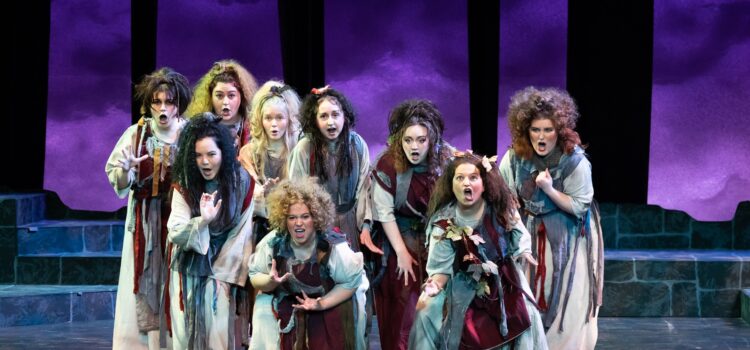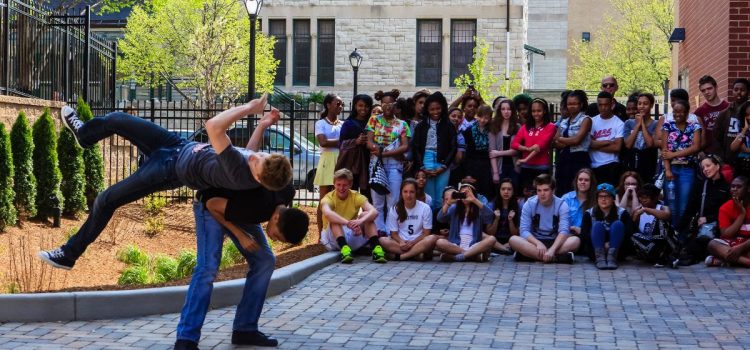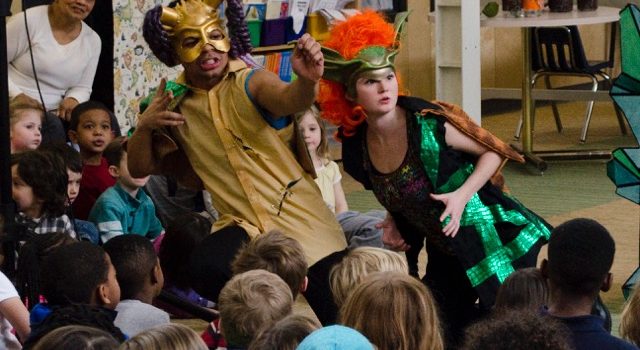By CB Adams
In his recent review in New York magazine of the Metropolitan Opera’s production of “Fedora,” Justin Davidson snarked, “’Fedora is an opera about décor.” The headline read, “At Least the Sofa Looks Fabulous.” That’s the kind of pronouncement relished by critics and reviewers, myself included (I do love a good snark, when well-deserved.)
In a backdoor sort of way, Davidson’s sentiment evoked an opposite reaction when assessing Winter Opera’s production of Giuseppe Verdi’s “Macbeth” at the Kirkwood Community Center. One of the major strengths of this production, stage directed by John Stephens, is precisely due to the minimal “décor” and sets. This approach, which was definitely not stagy nonchalance, enabled the production to focus on the essential moments in Shakespeare’s tale of power and corruption, Verdi’s score and the performances of the fine cast. The storyline is the thing, and the result was a solidly satisfying experience that served as a potent post-holiday palate cleanser – we all need a little opera, not a little more Christmas.
Calling the setting simple is not to belittle the work of scenic designer Scott Loebl. It’s to his credit, as well as lighting designer Michael Sullivan’s and technical director Jacob Cange’s, that the mood is so effectively set with appeared at times as a wall of blood, emphasizing the Macbeths’ descent into depravity. The cast members moved through the playing area as though a walk upon Shakespeare’s atmospheric heath.
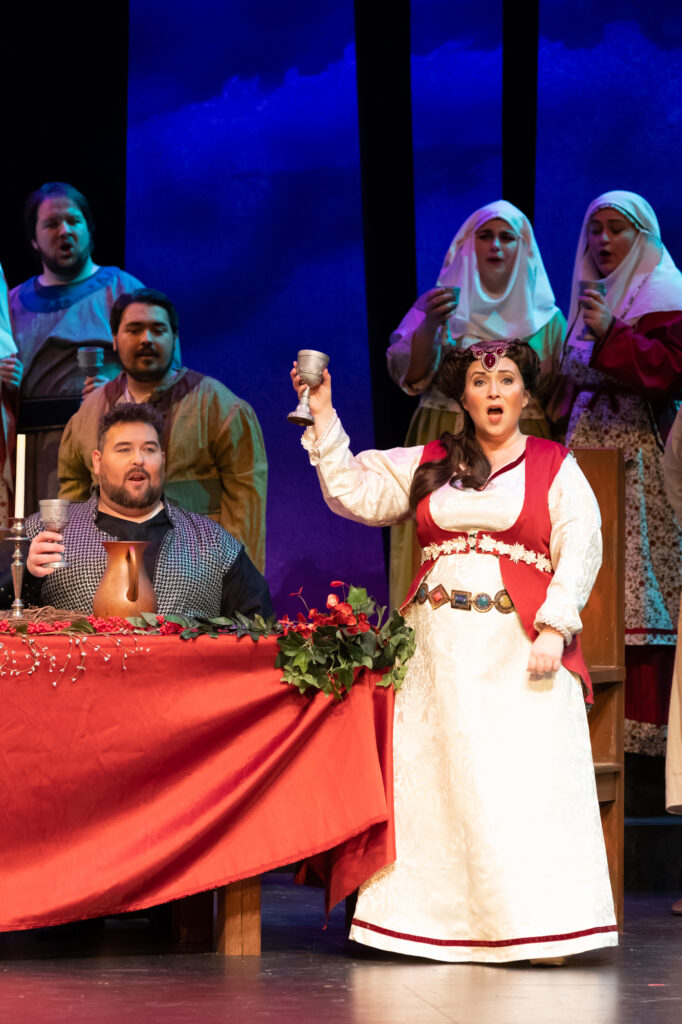
One of the risks of production of “Macbeth” in either its theatrical or opera forms, is overplaying the witchiness of the witches. This is not “Wicked” after all. Verdi makes this risk higher turning the play’s three witches into a chorus of witches. But this production makes great, prudent use of this gaggly coven, which sometimes offers comic relief and other times stirring up their portentous predictions. One of the witches contorted her face so dramatically it seemed like an effect that could only be achieve with a mask. Jim Carrey would have been jealous.
The leading roles were performed with uniform excellence by singing actors, several of whom have been in previous Winter Opera productions. The Macbeths, sung by Michael Nansel and Whitney Myers were convincing both singly and as a couple. Myers’ performance as Lady Macbeth offered many insightful moments, marred only by her line “Out, damned spot” through no fault of her own. The line elicited more than few chuckles because its meaning has been ruined after being reduced to an American advertising slogan. Pity.
Nansel as Macbeth also jelled with Nathan Whitson as Banquo. Both used their big, expressive voices to reveal the thoughts and tribulations of their characters. Equally impressive was Jonathan Kaufman as Macduff, especially when confronting (shall I say, laying on) Macbeth.
As with the chorus of witches, the supporting cast was seamless performed and put effective use. The supporting cast included Willard Moseley as Duncan, Damian Ziarko as Fleanzio, Angel Azzarra as a lady in waiting and Kevin Thomas Smith as Malcolm.
Verdi’s score received a well-balanced, thoughtful and atmospheric performance by the orchestra, directed by Edward Benyas. This was noticeable from the start, during the brooding, foreboding overture.
In the play, Lady Macbeth says, “What’s done cannot be undone.” In the case of Winter Opera’s “Macbeth,” what can’t be undone is a fine production of this Verdi-Shakespeare classic.
Winter Opera presented Verdi’s “Macbeth” on January 20 and 22, at the Kirkwood Performing Arts Center.
Photos by Rebecca Haas
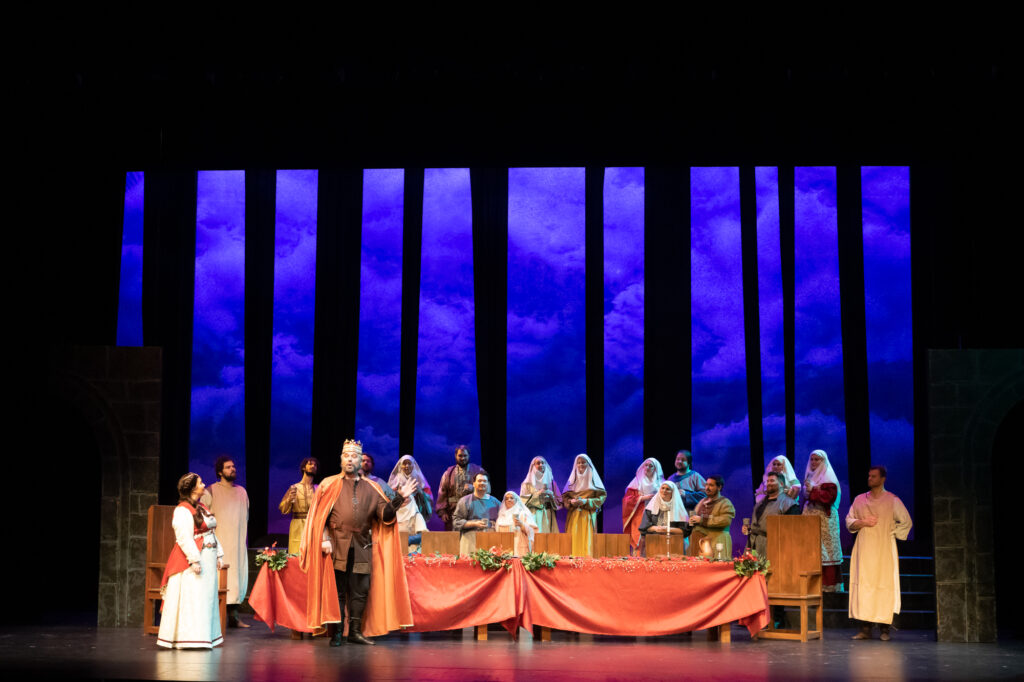

CB Adams is an award-winning fiction writer and photographer based in the Greater St. Louis area. A former music/arts editor and feature writer for the St. Louis Globe-Democrat, his non-fiction has been published in local, regional and national publications. His literary short stories have been published in more than a dozen literary journals and his fine art photography has been exhibited in more than 40 galley shows nationwide. Adams is the recipient of the Missouri Arts Council’s highest writing awards: the Writers’ Biennial and Missouri Writing!. The Riverfront Times named him, “St. Louis’ Most Under-Appreciated Writer” in 1996.

